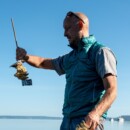Michael Behrens
Professor of Biology
he/him/his

Phone: 253-535-7565
Email: behrenmd@plu.edu
Office Location: Rieke Science Center - 145
Curriculum Vitae: View my CV
- Professional
- Biography
- Personal
- Video
- News
Additional Titles/Roles
- Director of Environmental Studies
Education
- Ph.D., Ecology, Evolution and Marine Biology, University of California, Santa Barbara, 2005
- M.A., Ecology, Evolution and Marine Biology, University of California, Santa Barbara, 2003
- B.S., Biological Sciences: Concentration in Fisheries and Marine Biology, Cal Poly at San Luis Obispo, 1996
Areas of Emphasis or Expertise
- Marine Ecology
- Disease Ecology
- Biogeography
Selected Presentations
- 10th International Larval Biology Symposium, Determining distribution and size of larval Pacific geoduck clams (Panopea generosa) in Puget Sound (Washington, USA) using a novel tracking approach, Berkeley, CA (2012)
- National Shellfisheries Association Annual Meeting, Novel tracking technique indicates importance of rare events driving larval connectivity of geoduck clams in Puget Sound, WA, Seattle, WA (2012)
- Western Society of Naturalists Annual Meeting, Novel tracking technique indicates importance of rare events driving larval connectivity of geoduck clams in Puget Sound, WA, Vancouver, WA (2011)
- Western Society of Naturalists Annual Meeting, Resource partitioning by intertidal Stichaeid fishes on the Olympic Peninsula, WA, Vancouver, WA (2011)
- Salish Sea Ecosystem Conference, Determining flow bias in the use of passive tube traps to study Geoduck larval transport in situ, Vancouver, BC (2011)
Selected Articles
- Beck, E.L., J. Ruesink, S. Troyer, M. Behrens. "Wild populations of Pacific oysters (Magallana gigas) emerge during the Blob heatwave in south Puget Sound, Washington USA." Frontiers in Marine Science Vol. 11, 2024: 1292062.
- Becker, B., M. Behrens, B. Allen, M. Hintz, H. Parker, M. McCartha, S. White. "Spatial and Temporal Distribution of the Early Life History Stages of the Native Olympia Oyster Ostrea lurida (Carpenter, 1864) in a Restoration Site in Northern Puget Sound, WA." Journal of Shellfish Research Vol. 39(1), 2020: 43-58.
- Becker, B., M. Behrens, B. Lemay†, Y. Shevalier, C. Henzler, E. Hoaglund, S. Staggers†, J. Brokenshire†. "Novel tracking technique indicates importance of rare events driving larval connectivity of geoduck clams in Puget Sound, WA." Journal of Shellfish Research Vol. 31(3), 2012: 1-13.
- Behrens, M.D. & K.D. Lafferty. "Temperature and food availability associations with geographic variation in the diet of opaleye (Girella nigricans)." PLOS One Vol. 7(9), 2012: e45901.
- Smith, K.F., Yabsley, M.J., Sanchez, S., Casey, C.L., Behrens, M.D., Daszak, P., Hernandez, S.M. and Foulsham, P.. "Salmonella isolates from wild caught Tokay Geckos (Gekko gecko) imported to the U.S. from Indonesia." Vector-Borne and Zoonotic Diseases Vol. 12(7), 2012: 575-581.
- Smith, K.F., M.D. Behrens & D.F. Sax. "Local scale effects of disease on biodiversity." EcoHealth Vol. 6, 2010: 287-295.
- Smith, K.F., M.D. Behrens, L. Schloegel, N. Marano, S. Burgiel & P. Daszak. "Reducing the risks of the wildlife trade." Science Vol. 324, 2009: 594-595.
- Smith, K.F., M.D. Behrens & L. Max. "U.S. drowning in unidentified fishes: scope, implications and regulation of live fish imports." Conservation Letters Vol. 1(2), 2008: 103-109.
Accolades
- K.T. Tang Faculty Excellence Award in Research, 2013-2014, PLU
- Fletcher Jones Fellowship, 2004-2005
- UC Marine Council, Graduate Fellowship, 2001-2003
- Outstanding Graduating Biological Sciences Senior, Cal Poly San Luis Obispo, 1996
- Marine Biology Scholarship, Cal Poly San Luis Obispo, 1992-1993
Biography
My teaching activities focus primarily on ecology and animal diversity. This includes general ecology and the ecology of marine and freshwater systems. My teaching in the area of animal diversity includes general coverage for lower division students and invertebrate zoology. I have the pleasure of teaching both in the Pacific Northwest and the Caribbean.
My research interests include ecology and biogeography, primarily in aquatic systems. Much of my past research has focused on interactions between herbivores and algae in marine systems. This has included studies of geographical gradients of herbivorous fish diversity and how temperature effects on physiology may play a role in driving this pattern and the effects of fisheries and disease on sea urchins and kelp forest ecology. My current research projects include studies of the community ecology of rocky shores of Puget Sound, disease ecology, and the ecology of early life history stages of oysters. These projects involve undergraduate student researchers at PLU and collaborators from the University of Washington and Harbor WildWatch.
Fun Facts
- Dr. Behrens has had a species of sea slug named after him (Chromodoris michaeli)
Flip-Flops and Field Work
Salish Sea After Dark: Community Science in the Intertidal Zone
Community Science on the Half Shell



Social Media